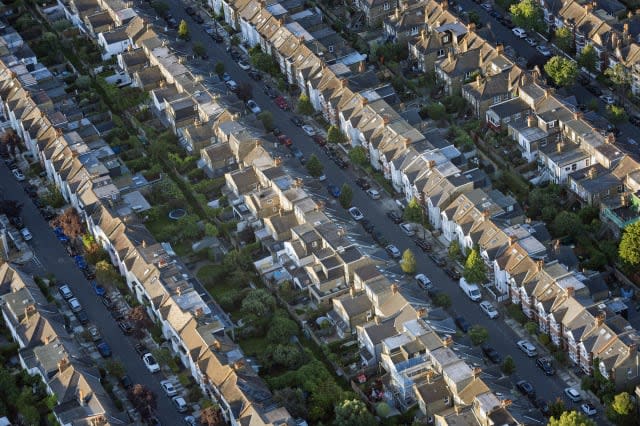Prospects looking brighter for housing market in 2020, say experts

The housing market should start 2020 with a new mood of confidence – but continued political uncertainties will keep a lid on property prices, economists predict.
Several predictions for house price growth across 2020 are clustered around the 2% mark.
Experts said the Conservatives’ recent general election win could help to bring more certainty to the market and unleash some pent-up buyer demand.
An abundance of low-rate and low-deposit mortgage deals should also support activity.
Some estate agents are even sensing there may be a “Boris bounce” for the housing market, which could in the coming months have an effect on house prices.
Lucy Pendleton, founder director of estate agent James Pendleton. said: “Not yet visible is the Boris bounce in house prices we all sense is already well under way.”
However, Brexit concerns could also pick up as 2020 progresses, making people behave more cautiously, and affordability constraints will also cap price growth in some parts of the UK, economists said.
Howard Archer, chief economic adviser at EY Item Club, said the Conservatives’ strong election win could ease some uncertainties and help house prices rise by around 2% in 2020.
But he said the economy still looks set for a “challenging 2020”.
Mr Archer said: “There will still be appreciable uncertainties, including on the Brexit front – so that the upside for house prices in 2020 is likely to be limited.”
Rightmove also predicts that the price of property coming to market will increase by 2% in 2020.
It said there is now an opportunity to release some pent-up buyer demand that had been building before the general election.
House sellers’ pricing power will be boosted by a lack of other options for potential buyers, Rightmove suggests.
Lawrence Bowles, senior research analyst at Savills, said: “At the top end of the market in particular, we’ve seen a strong build-up of new buyer demand.
“Greater political certainty will unlock some of that demand, but with less than a year to agree a Brexit deal, there are still many unknowns.
“As a result, we expect average house prices to rise by just 1.0% in 2020, and a higher 4.5% in 2021, as improving certainty translates into higher growth in wages and GDP.”
Looking further ahead, Savills predicts the North West of England and Yorkshire and the Humber will have the fastest house price growth over the next five years.
House prices in these areas were slower than those in southern England to recover after the financial crisis – meaning there is still more room for growth.
Mr Bowles continued: “Affordability constraints in London and the South East will cap potential price growth over the next few years.
“By contrast, prime central London – the most expensive core of the capital – now looks relatively good value on a world stage. We expect to see five-year growth totalling around 20%.”
The Royal Institution of Chartered Surveyors (Rics) has also pencilled in house growth of 2% for 2020 – but it believes rents will increase at a faster rate of 2.5% as the rental sector struggles with a lack of housing supply.
Meanwhile, Nitesh Patel, Yorkshire Building Society’s strategic economist, believes the number of house sales will hold steady at around 1.2 million annually – the total generally seen in recent years.
He said: “Sales to first-time buyers are buoyant and now account for around half of all house purchases.
“A strong jobs market and low mortgage rates are likely to support the market, but concerns around affordability may limit the number of people wanting to move home.
“Mortgage lenders are helping to maximise affordability by lending on 40-year mortgage terms, to help borrowers lower their monthly repayments.
“We’re seeing more and more lenders giving access to 5% deposit mortgages, which can be useful for those looking to buy their first home.”
David Hollingworth, associate director, communications at broker London and Country Mortgages, said that in the uncertain climate, mortgage borrowers have been locking into the low fixed-rate deals currently available, giving them certainty over their monthly repayments.
The range of longer-term fixed-rate mortgages has also been growing, he said, including deals which will lock borrowers into a single rate for 10 or even 15 years.
Russell Galley, managing director, Halifax, said housing market prospects for 2020 look “a bit brighter” than in 2019.
He continued: “However the shortage of homes for sale and low levels of house-building will continue to support high prices, while the challenges faced by prospective buyers in raising the necessary deposits may continue to constrain demand.
“As a result, our forecast for house price growth in 2020 is in the range of 1% to 3%, consistent with the pattern of weaker growth seen since 2017.”
Separate consumer research from Lloyds Bank found 43% of people think the biggest challenge for first-time buyers in 2020 will be raising a deposit, while 27% think it will be high property prices.
A quarter (25%) think the biggest challenge for existing home owners looking to move will also be expensive property prices, while 23% cited high moving costs.
Here is a round-up of house price predictions for 2020:
– EY Item Club – 2% average house price increase
– Rightmove – 2% average asking price increase
– Savills – 1% average house price increase
– Yorkshire Building Society – 0% to 2% house price increase
– Royal Institution of Chartered Surveyors – 2% average house price increase and 2.5% average increase in rents
– Halifax – House price inflation of between 1% and 3%.


